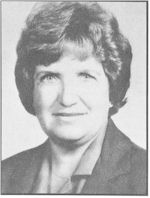Harriett B. Rigas
- Birthdate
- 1934/04/30
- Birthplace
- Winnipeg, MB, Canada
- Associated organizations
- Washington State University, Lockheed Missile and Space Company
- Fields of study
- Computing
- Awards
- IEEE Educational Activities Board (EAB) Meritorious Achievement Award in Accreditation Activities
Biography
Harriett B. Rigas is recognized as an electrical engineer with a worldwide reputation for her work in computer technology and computer engineering education. She helped to create the technology that made it feasible to update computer operating systems through the use of automatic patches, such as that available today in software referred to as "upgrades.' Such software eliminates the need to reinstall entire programs, saving both time and money. Rigas also improved methods used to create the codes used by computers to store and manipulate data.
Harriett Rigas was born in Winnipeg, Manitoba, Canada on 30 April 1934. She attended Queens University in Ontario, where she received a B.Sc. degree in 1956. Harriett worked as an engineer at the Mayo Clinic in Rochester, Minnesota in 1957, and began graduate studies at the University of Kansas in Lawrence, from which she received an M.S. degree in 1959 and a Ph.D. in electrical engineering in 1963. From 1963 to 1965, she worked as an engineer at the Lockheed Missile and Space Company in Sunnyvale, California.
Harriett joined the faculty of Washington State University (WSU) in 1965 and remained there until 1980, becoming manager of the school's Hybrid Facility in 1968 and professor of electrical engineering in 1976. At WSU, she also created the university's computer engineering program, developed its curriculum, and raised funds to support the program.
While working at WSU, Harriett served also as a professor at the Naval Postgraduate School in Monterey, California. In 1984 she was named chair of the electrical engineering department at that school. In 1987, Harriett joined Michigan State University, where she served as professor and chair of the electrical engineering department until her death in 1989.
She participated on many panels and advisory committees. In the 1970s, she chaired the Commission on the Status of Women and served as president of the Association for Faculty Women. In 1975-1976 Harriett was a program director for the National Science Foundation (NSF); she later became a member of its Electrical, Computer, and Systems Engineering Advisory Committee. She also was a member of the Navy Research Advisory Committee and the National Academy of Sciences Advisory Committee.
Harriett had a long and continuing interest in the accreditation process. Starting in 1975 she had served as an accreditation evaluator for electrical, computer, and systems engineering programs. From 1981 to 1986 she represented IEEE on the Engineering Accreditation Commission of the Accreditation Board for Engineering and Technology (ABET).
In 1980 and 1983, Harriett received the Engineer of the Year Award from the Spokane Section of the Institute of Electrical and Electronics Engineers (IEEE). In 1982 she received the Achievement Award of the Society of Women Engineers (SWE) in recognition of her "significant contributions in electrical engineering and computer technology: The following year, the University of Kansas presented her with its Distinguished Engineering Service Award. IEEE named Harriett a Fellow in 1984 "For contributions to programming of analog/hybrid computers and to the development of computer engineering curricula." She served on the IEEE Board of Directors in 1988, and as the IEEE Division V Director.
She received the IEEE Educational Activities Board (EAB) Meritorious Achievement Award in Accreditation Activities in 1988 "For outstanding service to IEEE and the engineering community in the development and implementation of accreditation criteria and processes." In 1995, EAB established the Harriett B. Rigas Award, sponsored by Hewlett-Packard, and presented annually to a woman who is an outstanding engineering educator of undergraduate students. The Association for Faculty Women also instituted a Harriett B. Rigas Award, which recognizes a student for outstanding work in a doctoral program.
She had a plaque in her office, presented to her with affectionate recognition by students at Washington State, that identified her as "The Elite Petite".
Harriett was married to Anthony L. Rigas, also an electrical engineer. He was named an IEEE Fellow in 1991 "For contributions to continuing education for engineers." They had one son, Marc, who received his Ph.D. in bioengineering from Penn State University in 1997.
